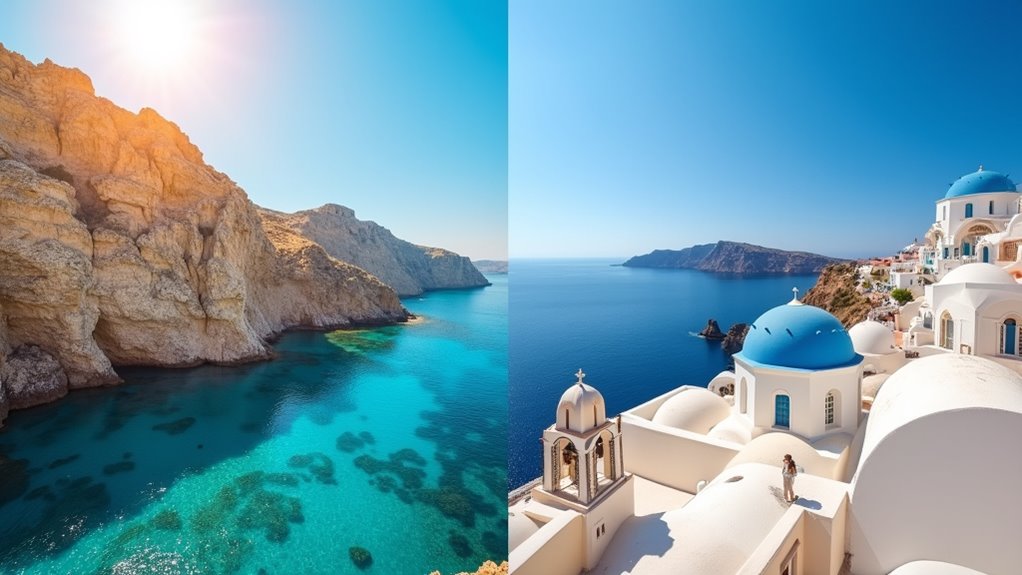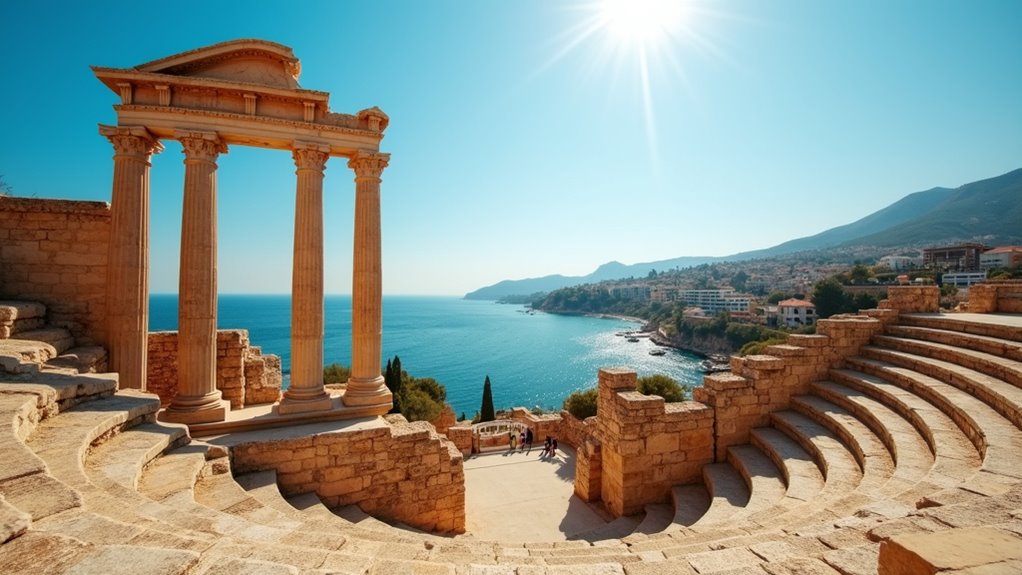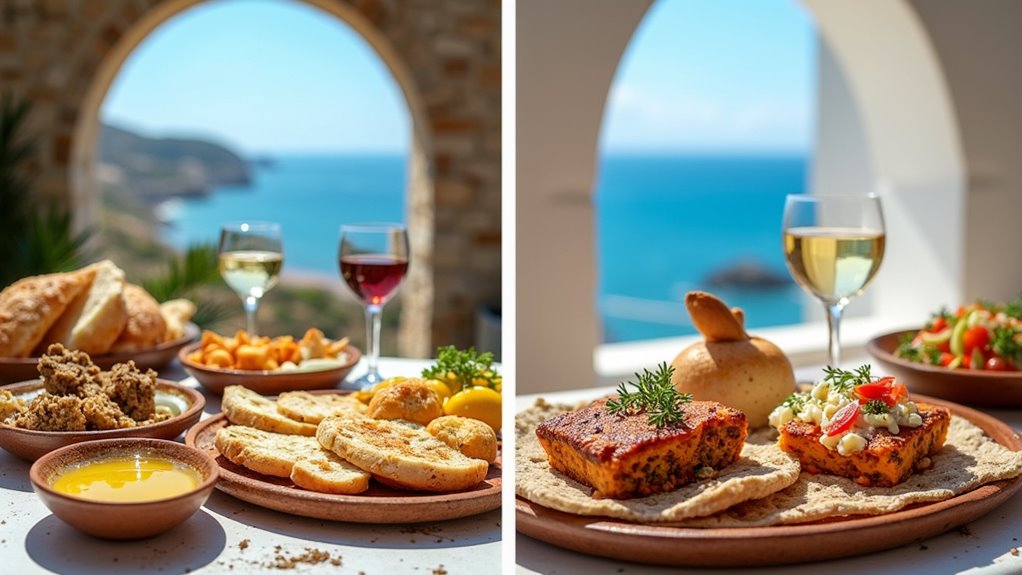Physical Address
304 North Cardinal St.
Dorchester Center, MA 02124
Physical Address
304 North Cardinal St.
Dorchester Center, MA 02124

In this Mediterranean showdown between Cyprus and Greece, discover which sun-soaked paradise truly delivers your dream vacation experience.
Cyprus and Greece both offer stunning Mediterranean experiences, but with distinct flavors. You’ll find better value in Cyprus with its fusion cuisine, narrower beaches, and blend of Greek-Turkish influences. Greece boasts more diverse landscapes, iconic ancient sites like the Acropolis, and a broader selection of islands. Cyprus sees fewer travelers, making for a more relaxed atmosphere, while Greek hotspots can get crowded. Your perfect Mediterranean escape awaits in the details below.

When you explore the historical treasures of the Mediterranean, both Cyprus and Greece offer a striking tapestry of ancient wonders that continue to shape tourism today. Cyprus boasts remarkable sites like Choirokoitia, one of the eastern Mediterranean’s most important prehistoric settlements dating back to the 7th millennium BC.
You’ll find Greece’s historical significance embodied in the iconic Acropolis of Athens, symbolizing ancient Greek civilization and cultural identity.
Meanwhile, Cyprus counters with Kourion’s well-preserved Roman and Byzantine ruins featuring an impressive amphitheater and beautiful mosaics. The site provides visitors with scenic views overlooking fields and sea while offering opportunities for exploration and cultural performances.
Both destinations showcase UNESCO World Heritage Sites—Greece with Delphi’s famous Oracle and Knossos’ Minoan Palace. Cyprus with Nea Paphos and its stunning Roman mosaics.
These ancient wonders aren’t merely relics—they’re economic engines driving tourism and preserving cultural heritage. Each country has cultivated luxury experiences around these historical attractions, attracting affluent travelers seeking both culture and premium accommodations.
While considering where to dip your toes in the Mediterranean, you’ll find both Cyprus and Greece offer spectacular coastal experiences that cater to every beach lover’s dream. Cyprus boasts primarily sandy shores with about 322 beaches, many ranked high on Tripadvisor.
Greece presents a diverse mix of sandy, pebble, and rocky beaches along its extensive coastline.
You’ll appreciate that both countries lead Europe in cleanliness and water quality, with Cyprus topping EU swimming water standards.
Half of Cyprus’ beaches are narrower (under 50 meters) and backed by cliffs or infrastructure, while Greece offers more variety in beach settings.
For eco-conscious travelers, both destinations prioritize sustainability through environmental policies and beach management practices, making them perfect for responsible Mediterranean getaways. The destinations have received numerous Blue Flag awards recognizing their commitment to maintaining clean and safe beaches.

Beyond the sun-drenched beaches lies another compelling reason to visit the Mediterranean: food that turns every meal into a cultural expedition.
While Greek cuisine leans heavily on lamb and coastal seafood dressed with lemon and oregano, Cypriot tables showcase pork-forward dishes accented with mint and tahini. You’ll notice Greece’s iconic horiatiki salad topped with crumbled feta, while Cyprus grates anari cheese over pasta dishes like ravioles.
The Mediterranean’s culinary identity reveals itself through contrasting flavors – Greece’s lamb and oregano versus Cyprus’s pork and mint specialties.
Both share Ottoman-influenced delights like slow-cooked kleftiko, though Cyprus adds its own spice blend. Greece serves its souvlaki open-style while Cypriots stuff theirs into pita pockets.
History shapes every bite – from Greece’s ancient culinary traditions to Cyprus’s fusion heritage blending Greek, Turkish and Middle Eastern elements. Each island’s food tells its unique story through shared Mediterranean ingredients. Deciding between these two destinations requires weighing your travel preferences carefully, just as you would when choosing between other European hotspots.
True Cypriot hospitality can be experienced through their traditional meze dining, where 15-20 small dishes are shared among diners instead of individual starters and main courses.
Although both Mediterranean destinations captivate visitors with their charm, the raw numbers reveal Cyprus’s remarkable tourism surge in recent years. In 2024, Cyprus welcomed 4.04 million travelers—four times its population and 5.7% above pre-pandemic records.
You’ll find this small island generating an impressive €3.2 billion in tourism revenue, contributing to 21% of its GDP. The UK remains Cyprus’s biggest fan base, followed by Israel and Poland.
December 2024 saw 133,063 visitors (up 7.6% year-over-year), showcasing Cyprus’s growing winter appeal. Greece remains the top destination choice for Cypriots traveling abroad, representing 31.2% of their international trips in December 2024. While Greece historically attracts around 30 million annual visitors, Cyprus’s growth trajectory demonstrates its resilience despite regional conflicts.
When planning your Mediterranean escape, remember Cyprus is breaking records while maintaining its intimate island atmosphere. Travelers looking for alternatives might consider Austria, where budget planning can make an Alpine vacation surprisingly affordable compared to peak-season Mediterranean costs.

The numbers only tell part of the Mediterranean story—it’s the cultural tapestry that makes your visit unforgettable. Cyprus offers unique experiences like the Paphos Seaside Street Food Festival and water-themed Kataklysmos celebrations that you won’t find elsewhere.
Both destinations showcase vibrant Orthodox Easter traditions, but Cyprus’s village celebrations have their own distinct character. You’ll find traditional Cypriot dances performed in village squares during events like the Lysos Festival, where locals prepare authentic dishes before your eyes.
Greece’s influence is evident throughout Cyprus, from shared culinary traditions to similar music, yet Cyprus maintains its unique identity through events like the Cherry Festival and Snail Festival. These community gatherings give you deeper access to local life than typical tourist attractions ever could.
The Agros Rose Festival in May provides an immersive experience with rose workshops and local cuisine while surrounded by the scenic beauty of this charming village. Whether you choose the historic coastal town of Paphos or the pristine beaches of Protaras, each Cyprus destination offers its own distinctive cultural atmosphere.
Reaching your Mediterranean dream destination requires careful consideration of transportation logistics and infrastructure.
Cyprus offers two international airports at Larnaca and Paphos, with Limassol port handling 90% of maritime traffic. You’ll find an extensive road network, though public transport is still developing. The island relies heavily on its well-developed highways connecting both rural and urban areas throughout the country. The island’s pushing electric vehicle infrastructure and green transport initiatives. Paphos and Limassol remain popular resorts for travelers seeking Cypriot charm with differing atmospheres.
Greece provides more entry points with major airports in Athens and Thessaloniki, plus significant ports like Piraeus, Thessaloniki, and Patras. The PATHE, Ionian, and Egnatia motorway systems connect major cities, but rail quality lags behind European standards. Greece is investing €6 billion in road projects, with over 1,184 km of motorways planned.
Both countries are working to align with European transport standards through TEN-T integration.

Planning your Mediterranean getaway requires honest talk about euros and cents before you pack those sandals. Cyprus offers better value overall, with a month-long trip averaging $4,435 per person compared to Greece’s pricier islands like Mykonos.
Let’s be real about your Mediterranean budget—Cyprus delivers sunshine at a fraction of Greek island prices.
You’ll find Cyprus accommodations start at $250 per person, with North Cyprus offering 20-30% savings. During low season, prices drop by half across the board.
Food costs won’t break your bank in either destination, but Cyprus’s traditional cuisine provides affordable options away from tourist traps. Mykonos has slightly higher restaurant prices at 15-20 USD per meal compared to Cyprus.
While public transport is budget-friendly in Cyprus, car rentals run higher than expected. If you’re considering a day trip from either destination, note that Dubrovnik offers top snorkeling spots with minimal entrance fees compared to some Greek marine parks. Most beaches are free, and museum entry fees won’t empty your wallet.
Book early and travel off-season to stretch your euros furthest in these Mediterranean gems.
While most travelers flock to Santorini’s caldera views or Limassol’s bustling beaches, true Mediterranean magic awaits in the forgotten corners of Cyprus and Greece.
In Cyprus, explore the restored village of Casale Panayiotis with its infinity pools nestled in the Marathasa Valley, or venture through Avakas Gorge‘s dramatic limestone canyon. Visit the breathtaking Agios Ioannis Lambadistis, a UNESCO World Heritage site comprising three Byzantine churches under one roof with remarkable frescoes dating back to the 13th century.
Meanwhile, Greece offers car-free Koufonisia with its sculpted sea pools and the longevity hotspot of Ikaria with midnight festivals. Consider adding Zagreb’s charm to your Mediterranean itinerary as Croatia’s capital offers cobblestone streets and magnificent architecture worth exploring.
Here are three unforgettable hidden experiences:
Whether you’re drawn to Greece’s 6,000 islands or Cyprus’s 300 days of sunshine, you can’t go wrong with either Mediterranean gem. They’re both steeped in history, blessed with gorgeous beaches, and bursting with flavor. Your choice boils down to what you’re after: Greece’s iconic variety or Cyprus’s compact charm. Trust your gut, pack your sunscreen, and you’ll find your perfect Mediterranean match.